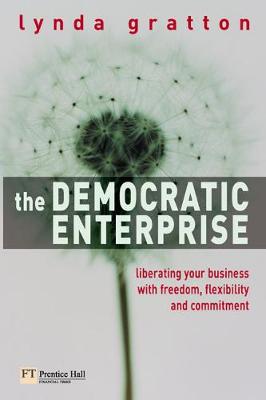"Gratton's book is timely and important. She is one of a small but influential band of business academics who have begun to question the "ideological gloomy paradigm" - the overwhelmingly negative assumptions about human nature that historically underpin management theorising. The Democratic Enterprise is one of the first interventions to crystallise these dissatisfactions and offer steps to a positive alternative model...The revolution is democracy and it starts here."
The Observer
"One of Britain's leading lights in human resource strategy"
Financial Times
Liberating your Business with Freedom, Flexibility and Commitment
The Democratic Enterprise delivers the blueprint for a business built on choice and commitment. A business made fast through freedom and purposeful through meaning. This is a business people would choose to work for.
These days individuals matter more than their roles, so how can we change the way we manage and organise people to make the most of their talent and energy? The free to choose are fast to act for an enterprise they believe in, but they're also the first to leave an organisation that fails them. In The Democratic Enterprise HR guru Lynda Gratton sets out a practical blueprint for designing smarter working relationships based on free choice and shared purpose - where autonomy, choice and trust breed speed, flexibility and commitment. This is the business we'd choose to work for, even if we have the talent and ability to leave.
Smart people want a more grown-up relationship with their employers these days. And most businesses too, realise that they can get more from people through flexible and intelligent working relationships. So imagine a company where people have more freedom in how, where and when they work. Where they have more personal choice in their work, but also share more commitment with their colleagues to a bigger purpose. This is a business we would choose to work with.
The Democratic Enterprise explores, from the perspective of the individual and the organization what it means to craft choice, and shows us how to use some of the basic principles of democracy to build organizations of which we can be proud.
The book examines eight companies which have pioneered choice and democracy, and shows how:
the oil giant BP has created transparent internal markets for jobs enabling every employee to develop a breadth and depth of competencies
McKinsey & Co. has brought an unprecedented level of transparency to the ways in which associates can choose the projects to work on
Sony have created a ground-breaking digital system by creating a context in which engineers have real freedom to create worthwhile and meaningful jobs
Unisys has enabled every employee to access an enormous range of training opportunities to ensure they are truly becoming ‘the best they can be’.
Goldman Sachs builds choice around the development relationships which are so crucial to personal and organizational development
AstraZeneca has brought complete transparency to employee access to pay and benefits.
BT has enabled many tens of thousands of employees to make locational choice
and finally, how HP has built discretion around time.
Learn how each of these companies have pioneered the tenets of democracy and choice and by doing so have created strong, agile enterprises powered by employee engagement and collaboration.
The Democratic Enterprise concludes by building a mandate for choice and democracy through focusing on the four building blocks: supporting individual autono
- ISBN10 0273675281
- ISBN13 9780273675280
- Publish Date 27 November 2003
- Publish Status Out of Print
- Out of Print 15 March 2021
- Publish Country GB
- Imprint Financial Times Prentice Hall
- Format Paperback
- Pages 272
- Language English
